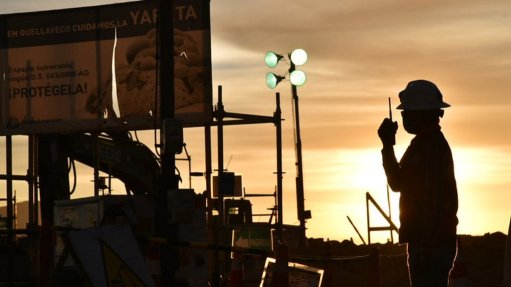Strike over bonuses hits Vale’s Mozambique operations
Some 1 400 employees of Vale Mozambique, the subsidiary of Brazilian mining major Vale operating in the south-east African country, went on strike last week over bonus payments, the Mozambique news agency AIM reported. The issue was a decision by the parent group not to pay profit-sharing bonuses, called “variable renumeration”, to any employee in any of its operations around the world. This was, the group stated, because its financial results last year did not reach the level required to permit the paying of the bonuses. This, in turn, was the result of the fall in commodity prices.
Vale Mozambique owns the Moatize metallurgical coal mine, in Tete province. National Union of Industry, Wood and Mines Workers Tete provincial secretary Fernando Raice told AIM that the mining company had been making many cuts to its subsidies to the workers. In addition, the news of the cutting of the bonus came late, which increased the discontentment of the workers. He regarded the strike as legitimate.
At full capacity, Moatize Phase 1 will be able to produce 11-million tons/year (Mt/y), comprising 8.5 Mt/y of metallurgical or coking coal and 2.5 Mt/y of thermal coal. From 2017 onwards, after the completion of Phase 2, it will have an annual production capacity of 22 Mt/y, which will continue all the way to 2042. Until now, the coal produced by Moatize has been transported to the coast, for export, along the 575 km Sena Railway to Beira, but this has suffered from inadequate capacity and various problems, such as lines being undermined by floods in the rainy season, which have prevented Moatize from reaching its full Phase 1 production capacity. However, the line is undergoing an upgrade which should be finished in the next few months.
The development of the second phase of Moatize has been paralleled by Vale’s development of the Nacala corridor, to provide an alternative route for Moatize coal to reach the sea. This involves the laying of new track, mainly in Malawi, and the refurbishment of existing lines in Malawi and Mozambique, and the construction of a coal export terminal at the port of Nacala. The line from Moatize to Nacala runs for 912 km and it has a capacity of 18 Mt/y.
According to the Economist Intelligence Unit, the entry into full service of the Nacala line and the upgrading of the Sena line will allow coal production in Tete province – where there are several coal mines operated by different companies – to increase more rapidly during this year and next. All these mines have suffered from difficulties in exporting their output because of the previous inadequacies in the logistical infrastructure.
Meanwhile, the director-general of Mozam-bique’s Investment Promotion Centre, Lourenço Sambo, has affirmed to local media that the current “politico-military tension” in the country will not hurt the rhythm of foreign investment in the country. He argued that this tension was localised and cyclical – “it always happens after elections” – and forecast that the country would gain investments of up to $7-billion.
Nevertheless, by February 17 some 5 000 Mozambicans had fled to safety in Malawi (although government blamed the effects of the drought as well as attacks by armed men “supposedly [from opposition party] Renamo”) as the cause. On February 8, Renamo threatened to take control of traffic running on National Routes 1, 6 and 7 in retaliation for assaults on, and murders of, a number of its members in Sofala, Manica and Tete. On February 11, armed men attacked four vehicles on Route 1, in the Chibabava district of Sofala province. A fifth vehicle was attacked the next day. There were no deaths, although several people suffered light injuries. Then, on February 17, armed men attacked a security post on Route 1 in the Gorongosa district of Sofala. One attacker and one member of the Defence and Security Forces were killed. That same day, in Maputo, Members of Parliament for the ruling Frelimo party and opposition Renamo blamed each other for the violence. And, on February 18, the Defence and Security Forces instituted compulsory escorted convoys on Route 1 between Save and Muxúnguè. It should be noted that the Sena Railway runs through Sofala province.
Comments
Press Office
Announcements
What's On
Subscribe to improve your user experience...
Option 1 (equivalent of R125 a month):
Receive a weekly copy of Creamer Media's Engineering News & Mining Weekly magazine
(print copy for those in South Africa and e-magazine for those outside of South Africa)
Receive daily email newsletters
Access to full search results
Access archive of magazine back copies
Access to Projects in Progress
Access to ONE Research Report of your choice in PDF format
Option 2 (equivalent of R375 a month):
All benefits from Option 1
PLUS
Access to Creamer Media's Research Channel Africa for ALL Research Reports, in PDF format, on various industrial and mining sectors
including Electricity; Water; Energy Transition; Hydrogen; Roads, Rail and Ports; Coal; Gold; Platinum; Battery Metals; etc.
Already a subscriber?
Forgotten your password?
Receive weekly copy of Creamer Media's Engineering News & Mining Weekly magazine (print copy for those in South Africa and e-magazine for those outside of South Africa)
➕
Recieve daily email newsletters
➕
Access to full search results
➕
Access archive of magazine back copies
➕
Access to Projects in Progress
➕
Access to ONE Research Report of your choice in PDF format
RESEARCH CHANNEL AFRICA
R4500 (equivalent of R375 a month)
SUBSCRIBEAll benefits from Option 1
➕
Access to Creamer Media's Research Channel Africa for ALL Research Reports on various industrial and mining sectors, in PDF format, including on:
Electricity
➕
Water
➕
Energy Transition
➕
Hydrogen
➕
Roads, Rail and Ports
➕
Coal
➕
Gold
➕
Platinum
➕
Battery Metals
➕
etc.
Receive all benefits from Option 1 or Option 2 delivered to numerous people at your company
➕
Multiple User names and Passwords for simultaneous log-ins
➕
Intranet integration access to all in your organisation


















